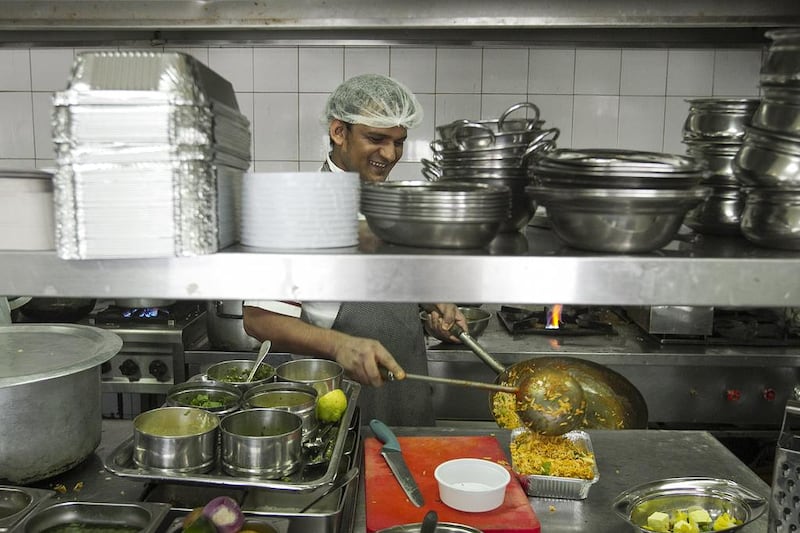ABU DHABI // Most workers in Abu Dhabi’s 2,500 small restaurants do not speak fluent Arabic or English, making it a challenge for them to understand and follow safety guidelines and regulations.
Sixty-nine per cent of managers and 73 per cent of food handlers in the capital speak South Asian languages such as Urdu, Hindi and Malayalam.
To help them understand and follow food-safety rules, the Abu Dhabi Food Control Authority is using photographs to teach them how to handle food safely and according to international standards.
Small catering businesses in most countries have the lowest standards of food safety, the ADFCA says.
The scheme is an extension of a pilot involving 600 small restaurants carried out over the past two years.
“We want to raise the culture of food safety among these food handlers and help these food establishments avoid violating the law, because sometimes they don’t mean to,” said Dr Mariam Al Yousuf, executive director of policy and regulation at the ADFCA.
“Most of them are illiterate and the education level is very low. They don’t read Arabic or English.
“Some of them don’t even read their own language, so I don’t expect them to know the law, or read the law or know the regulations.”
All independently owned restaurants, cafeterias, cafes and take-aways that can seat up to 50 patrons, employ about 10 workers and serve more than 100 meals daily are expected to take part in the Salamat Zadna, or Our Safe Food initiative.
For now, participation is voluntary, but Dr Al Yousuf encouraged all small catering businesses to introduce the programme as it will eventually be mandatory.
“We will give a grace period for the food establishments. We will not enforce it until I can make sure that they are ready,” she said, adding the grace period could be as long as a year.
“I can’t enforce it now because I’m not sure they are ready. I need to make them ready. This is our role.”
The authority will send advisers to train managers in introducing a food-safety management system.
Workers will be taught safety procedures such as proper hand washing, food storage and cooking and personal hygiene.
The businesses will each be given a Guide to Safe Food Handling package that includes 10 picture cards depicting safe procedures.
An Arabic and English description of each procedure is written on the back of the cards.
Chilled storage, protective clothing, hand washing, personal hygiene, handling ready-to-eat food, washing fruit and vegetables, cleaning high risk surfaces and cooking are covered.
Managers will also be handed a food-safety diary, which they will use to assess whether their employees are following the 10 procedures each day.
Dr Al Yousuf said the small businesses might not be able to afford to introduce the safety management system, so the authority was providing it free of charge.
“We invest as a government. We invest to produce a food-safety management system to be implemented in the small businesses. This is an intervention of the Government to produce this.”
For Ramesh Shetty, 48, the Indian owner of three small restaurants, the guide was “very useful”.
“It is very helpful for our staff, who speak different languages,” said Mr Shetty, whose kitchen was used as the setting for many of the photographs used in the guide.
“Learning by demonstrations and simple steps using the Salamat Zadna cards is appreciated and welcomed by all the staff.
“Having the Salamat Zadna adviser at our restaurant is an added advantage as I am not able to send my limited staff away for training.”
rpennington@thenational.ae






